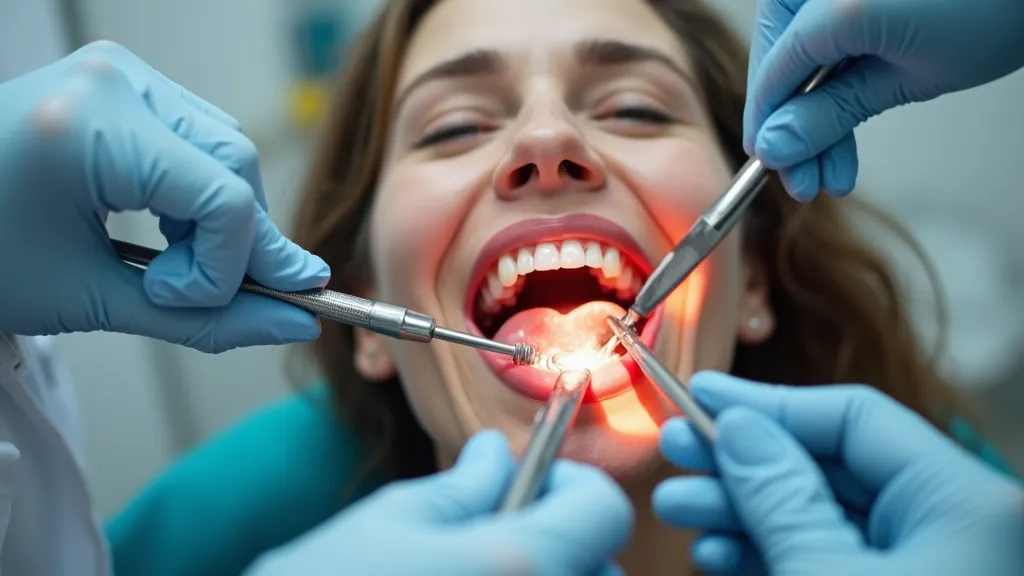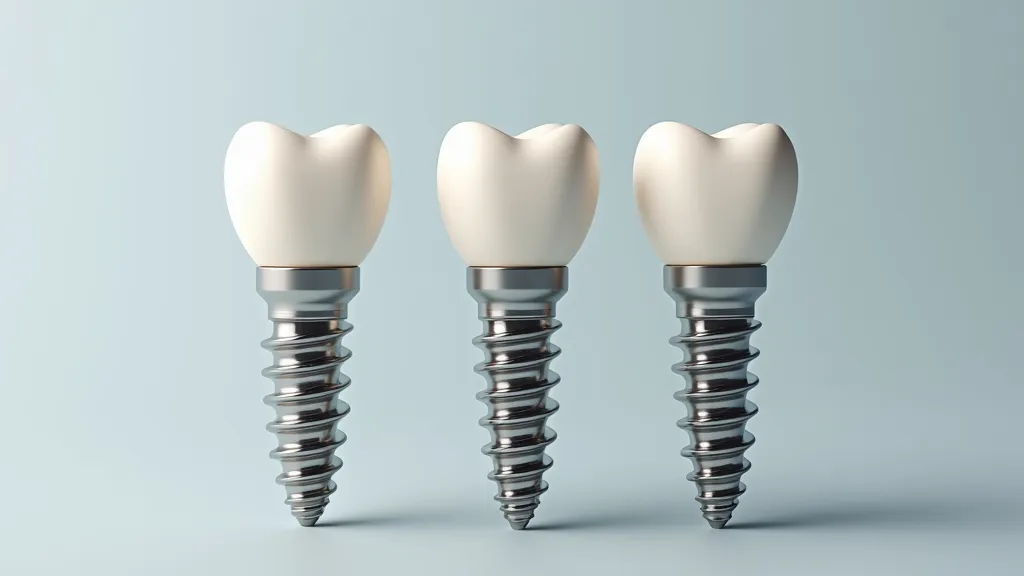Optimal Dental Implants for Seniors
This guide delves into the advantages of good dental implants for seniors, providing a comprehensive analysis of the considerations and procedures involved. Good dental implants are a reliable solution for restoring oral function and aesthetics in seniors. These implants are increasingly becoming the preferred choice due to their durability and effectiveness.

Exploring Good Dental Implants for Seniors
Good dental implants offer a viable and sustainable solution for seniors seeking to regain oral function and restore their smile. As age progresses, dental health can deteriorate, resulting in tooth loss that impacts not only aesthetics but also overall health. Dental implants serve as artificial roots, providing a strong foundation for attaching replacement teeth. The advantages of these implants extend beyond mere aesthetics; they contribute to better oral hygiene, preventing further bone loss and improving the quality of life for seniors.
To fully appreciate the importance of dental implants for seniors, it is essential to consider the various challenges they face. Aging often brings about a multitude of health-related issues, which can complicate dental care. Consistently addressing oral health is essential, as poor dental hygiene can lead to chronic diseases such as diabetes and heart disease. With this in mind, dental implants prove to be an excellent solution, as they simplify oral maintenance and help seniors retain their independence by preserving their ability to eat, speak, and smile without discomfort.
The Science Behind Dental Implants
Dental implants are typically made of titanium, a biocompatible material, ensuring that the body does not reject them. Biocompatibility is essential because it allows the implant to fuse with the jawbone through a natural process known as osseointegration, where the bone cells grow around the implant to create a stable base. This stability is crucial for seniors, as bone health often declines with age, making traditional restorations less viable.
The procedure for getting dental implants generally involves multiple steps. Initially, a comprehensive examination and imaging, such as X-rays or CT scans, are performed to assess the jawbone's condition and determine the best placement for the implants. After the examination, a surgical procedure is conducted to embed the implants into the jawbone. This is followed by a healing period, which may last anywhere from a few weeks to several months, during which the jawbone fuses with the implant. Finally, once osseointegration is successful, the dentist attaches an abutment and a custom-made crown to complete the restoration.
Additionally, advanced techniques and technologies are consistently being developed to make implants more accessible and effective for seniors. For instance, guided implant surgery involves using three-dimensional imaging and computer software to plan the precise placement of the implants, enhancing accuracy and reducing recovery time. Moreover, many dentists are exploring the use of immediate-load implants, which allow for quicker restoration of teeth, giving seniors the ability to eat normally soon after the surgery.
Advantages of Dental Implants for Seniors
- Improved Oral Function: Implants act like natural teeth, restoring the ability to chew effectively. This is particularly important for seniors who may struggle with traditional dentures, which can often slip or cause discomfort while chewing.
- Enhanced Comfort: Unlike traditional dentures, implants do not slip, ensuring comfort and stability. This eliminates the need for messy adhesives typically used to keep dentures secure.
- Maintaining Jaw Structure: Implants prevent the deterioration of the jawbone that occurs with tooth loss. When a tooth is missing, the supporting bone can begin to resorb (deteriorate), leading to further loss of teeth and changes in facial structure. Implants serve as a replacement root, stimulating the bone and preserving its integrity.
- Aesthetic Improvements: They help maintain facial structure, providing a youthful appearance. Well-placed implants can restore the natural contours of the mouth and face, helping seniors avoid the sunken look that can come with missing teeth.
- Enhanced Speech: Dental implants can improve articulation and reduce slurring that can occur due to missing teeth or ill-fitting dentures. This communicative benefit can greatly enhance social interactions and self-esteem among seniors.
- Convenience: Unlike dentures, which must be removed for cleaning and overnight soak solutions, implants remain fixed in place and require regular brushing and flossing like natural teeth. This ease of care encourages better oral hygiene practices for seniors.
Cost Considerations and Accessibility
Cost remains a significant factor in the decision-making process for dental implants, especially for seniors who may be living on a fixed income. Dental implants can be a considerable investment, but they are often a long-term solution, which can be more cost-effective over time compared to traditional dentures. To address affordability, several clinics offer budget-friendly options and payment plans. Understanding the cost differences across regions can assist in making an informed choice. In English-speaking countries, costs can vary significantly, often influenced by the expertise of the dental professional and the complexity of the case. Let's explore some cost ranges:
| Country | Currency | Price Range |
|---|---|---|
| United States | USD | $3,000 - $6,000 |
| United Kingdom | GBP | £2,000 - £2,500 |
| Australia | AUD | AU$3,500 - AU$6,500 |
| Canada | CAD | CA$3,000 - CA$5,500 |
How to Save on Dental Implants
Securing affordable dental implants for seniors involves exploring various resources and locations. Beyond seeking clinics that offer senior discounts and financing options, it may be valuable to look into programs that provide dental care assistance, such as those offered by universities or community health centers. Many dental schools have clinics where students, under supervision, provide treatment at reduced costs.
Furthermore, dental tourism has gained traction as a means for seniors to receive necessary dental care at significantly lower prices abroad. Countries such as Mexico, Costa Rica, and Hungary have become popular destinations for dental procedures, offering high-quality treatments for a fraction of the cost. However, it is crucial to consider factors like travel costs, accommodations, and the standard of healthcare abroad before proceeding with dental tourism. Careful research is necessary to verify the qualifications of practitioners and the safety of facilities.
| Website | Features |
|---|---|
| Dental Views | Offers low-cost dental implant solutions with detailed cost information and FAQs. |
| Atlantic Dental Group | Provides a range of dental services with easy appointment scheduling and possible financing. |
| DentaVacation | Assists in arranging dental treatments abroad to reduce costs, including travel arrangements. |
source: Dental Views, Atlantic Dental Group, DentaVacation
FAQs on Good Dental Implants for Seniors
Q: Are dental implants safe for seniors?
A: Yes, dental implants are generally safe and highly successful for seniors, provided they have adequate bone density and are in good overall health. It is essential for seniors to consult with their healthcare providers to assess any underlying conditions that may affect their candidacy for the procedure.
Q: How long do dental implants last?
A: With proper care, dental implants can last a lifetime; however, the attached crowns may need replacement due to wear over time. Regular dental check-ups and good oral hygiene are key to ensuring the longevity of dental implants.
Q: Can implants improve senior nutritional health?
A: Absolutely. By restoring chewing ability, implants enable seniors to enjoy a more varied and nutritious diet. This newfound ability can lead to better overall health, as a balanced diet is crucial for maintaining strength and vitality in later years.
Q: Is there any pain associated with getting dental implants?
A: Most patients report limited discomfort during the implant process, thanks to local anesthesia and sedation options that can be provided. Post-operative discomfort is usually manageable with over-the-counter pain relief medications.
Q: What is the recovery time for dental implants?
A: The initial recovery period after implant surgery typically lasts a few days to a week for most seniors, with the complete osseointegration process taking a few months. During this time, patients might be advised to consume soft foods and follow specific care instructions from their dentist.
Disclaimer: The above information comes from online resources, and the data is as of October 2023. Dental implant prices are for reference only and may vary by region, clinic, and doctor. It is always recommended to seek personalized estimates and treatment plans based on individual needs and consultations with healthcare professionals.
For more information, visit: Dental Views, Atlantic Dental Group, DentaVacation
Understanding the Dental Implant Procedure
For those considering dental implants, understanding the procedure is paramount. The journey typically begins with a thorough consultation where an oral surgeon or a periodontist will evaluate the patient's oral health, including bone density and gum condition. This step is crucial as it helps identify any preliminary treatments necessary to prepare the mouth for implants.
In cases where bone density is insufficient, supplemental procedures such as bone grafting may be required. Bone grafting involves taking bone from another part of the body or using synthetic materials to encourage the growth of new bone in the jaw, providing a sufficient foundation for the implant.
Once deemed ready for the implant, patients will undergo the surgical procedure under local anesthesia or sedation, depending on the complexity of the procedure and the patient's comfort level. The process generally involves the following steps:
- Implant Placement: The surgeon makes a small incision in the gum to expose the jawbone and creates a space for the titanium implant. Using precise surgical tools, the implant is placed into the jawbone.
- Healing and Osseointegration: After the implant is placed, a waiting period begins wherein the jawbone fuses with the implant. This integration can take several months and is vital for ensuring the implant's stability.
- Abutment Attachment: After healing, a minor surgical procedure is conducted to attach the abutment. This small connector is placed on top of the implant to hold the crown. Patients often experience minimal discomfort during this stage.
- Crown Placement: Once the gums have healed around the abutment, an impression is taken to create a custom crown. The final crown is then attached to the abutment, completing the restoration process.
Post-Operative Care for Dental Implants
Following the dental implant procedure, adhering to proper aftercare is essential to promote healing and ensure the longevity of the implants. Here are some key guidelines for post-operative care:
- Maintain Oral Hygiene: Good oral hygiene is crucial. Patients should brush gently around the implant site and can use an antimicrobial mouth rinse as advised by their dentist.
- Control Discomfort: Over-the-counter pain relievers can be used to manage any post-surgical discomfort. Patients should follow the dentist’s recommendations regarding medication and dosage.
- Follow-Up Appointments: Regular follow-up visits are important to monitor the healing process and check the implant’s integration with the bone.
- Dietary Adjustments: In the initial days following surgery, soft foods should be consumed to prevent pressure on the implants. Foods like yogurt, mashed potatoes, smoothies, and soups are ideal options.
- Avoid Nail Biting and Chewing Hard Foods: Patients should refrain from any activities that might disrupt healing, including hard foods and nail-biting.
Awareness of potential complications is also essential. While dental implants are generally safe, some individuals may experience issues like infection, implant failure, or prolonged healing. It is imperative to communicate any unusual symptoms, such as swelling, fever, or persistent pain, to the healthcare provider promptly.
Long-term Maintenance of Dental Implants
Once dental implants are successfully integrated and restored, they require ongoing care to maintain their integrity. Here are the recommended long-term maintenance strategies:
- Regular Dental Check-Ups: Routine dental visits every six months are essential for professional cleanings and assessments, ensuring the implants remain healthy and functional.
- Daily Oral Care: Patients should continue practicing good oral hygiene by brushing twice daily and flossing at least once a day. Special floss or interdental brushes may be recommended to clean around abutments.
- Quit Smoking: Smoking can impact healing and increase the risk of implant failure. Seniors who smoke are strongly advised to quit to enhance the success of their dental implants.
- Healthy Diet: Maintaining a healthy diet rich in calcium and vitamins contributes to overall oral health and bone density, supporting the longevity of implants.
By adopting these proactive measures, seniors can enjoy the benefits of their dental implants for many years. Through proper care and with regular dental evaluations, implants can successfully serve as a robust solution to dental challenges faced by many seniors.
Exploring Alternatives to Dental Implants
While dental implants are a remarkable solution for tooth loss, they may not be suitable for everyone. Seniors considering dental implants should explore all available options and consult with dental professionals to discuss alternatives.
Among the leading alternatives are:
- Traditional Dentures: Dentures that are removable may be suitable for seniors who prefer a non-surgical solution. While they provide aesthetic and functional benefits, they often require adjustments for comfort and can pose challenges like slipping and discomfort during wear.
- Dental Bridges: Bridges can replace one or more missing teeth. They consist of crowns on adjoining natural teeth that support a false tooth. Although bridges do not require surgical intervention, they necessitate the alteration of adjacent teeth, which some seniors may want to avoid.
- Resin-Bonded Bridges: Particularly useful for replacing front teeth, this option offers a less invasive solution and does not involve the alteration of adjacent teeth. They are generally less durable than other types of bridges.
Each of these alternatives carries its own set of advantages and limitations, and it's essential for seniors to carefully weigh their options in consultation with their dental healthcare team.
Emotional and Psychological Benefits of Dental Implants
Beyond the physical advantages, dental implants can significantly enhance the emotional and psychological well-being of seniors. Loss of teeth can lead to feelings of embarrassment, social withdrawal, and decreased self-esteem. The robust foundation provided by dental implants allows seniors to regain their confidence, facilitating social interactions and restoring their enjoyment of food.
Furthermore, improved oral health can contribute to better overall health. Studies suggest that there is a direct correlation between oral health and mental well-being; therefore, restoring smiles can lead to increased happiness and support overall quality of life. This alignment of physical and emotional health makes dental implants a worthy investment for many seniors.
Conclusion: The Future of Dental Implants for Seniors
As advancements in dental technology continue to grow, the future of dental implants looks promising, with new techniques that enhance comfort and accessibility for seniors. Innovations such as digital dentistry and 3D printing of dental implants are set to revolutionize procedures, making them more efficient and patient-friendly.
In summary, good dental implants provide a powerful solution for seniors wishing to regain oral function, aesthetics, and overall health. With thorough planning, proper aftercare, and continuous advancements in dental science, seniors can embark on their journey toward achieving a renewed smile and improved quality of life. Importantly, each senior's situation is unique, and therefore, personalized treatment plans should be developed in cooperation with experienced dental professionals to achieve the best outcomes.










